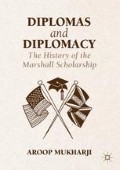Abstract
The arrival of Sir Christopher Meyer to Washington, DC, as HM Ambassador in 1997 signaled the last great revitalization of the alumni society. Like many in his era of service, Meyer’s advocacy of a close Anglo-American accord originated in the shadowy uncertainty of the Cold War piste. As the Foreign Office spokesman from 1984 to 1988, he had “a ringside seat” to the “[US–UK] handling the Soviet Union and the emergence of Gorbachev.” A fellowship at Harvard 1 year later—which included homestays in Oklahoma, Texas, and Louisiana—brought him even closer to the fore of American education. To Meyer, the Marshall, as a form of educational and cultural diplomacy, was “feed corn” for the transatlantic partnership. He quickly became a close ally of the AMS and helped it to build on the institutional groundwork laid by previous eras, to elevate its programming, and to modernize for the twenty-first century as it had fallen, just as in the early 1980s, into a state of relative languor.
Access this chapter
Tax calculation will be finalised at checkout
Purchases are for personal use only
Notes
- 1.
1. Before Eachus’ work in the 1980s to recover contact information for ‘lost’ Scholars, the British government had little official contact with Marshalls after they left the UK. Not only did that oversight translate to an incomplete appreciation of the Marshall program’s impact, but it also prevented the British government from being able to revisit its investment by actively engaging the vast network of Marshall Scholars in the US. Eachus’ work laid the initial groundwork toward that end, and Meyer’s ambassadorship from 1997-2003 established the first major and centralized effort by the British Government to utilize it diplomatically. Today, Scholars experience an unbroken line of communication with the British government from their time on the Scholarship.
- 2.
2. Correspondence between Meyer and author [email], 11 June 2014.
- 3.
3. “What I would do if I were God,” Meyer said, “is I would put in more money. I would double the number of Marshall Scholars.” Author interview with Meyer, 21 March 2014.
- 4.
4. Author interview with Bob Kyle, 31 January 2013.
- 5.
5. Author interview with Meyer, 8 February 2013.
- 6.
6. Author interview with Bob Gray, 28 January 2013.
- 7.
7. See: Aroop Mukharji, “The Starbucks Initiative: A Look at the History of the AMS,” Marshall Alumni Newsletter, March 2013, pp. 6–10, Accessed August 2014, Available: http://www.marshallscholars.org/assets/attachments/Marshall%20Newsletter%20March%202013.pdf.pdf.
- 8.
8. Author interview with Ted Leinbaugh, 27 January 2013.
- 9.
9. Based in Atlanta, Boston, Chicago Houston, Los Angeles, New York City, San Francisco, and Washington, DC.
- 10.
10. AMS Board membership varies between 15 and 25 members. See: Mukharji, “The Starbucks Initiative,” pp. 6-10.
- 11.
11. The Advisory Board, which is a part of the AMS, is different from the Advisory Council, which advises the Ambassador and the MACC on selection. Author interview with W. N. Harrell Smith IV, 12 February 2013.
- 12.
12. Author interview with Bill Coquillette, 22 January 2013; Author interview with Gray, 28 January 2013.
- 13.
13. This initiative began with Leinbaugh’s efforts to connect young Scholars to earlier generations through pre-departure programming. Pre-departure orientation programs have been organized since the Scholarship’s first year in 1954, but the alumni society has only recently played a larger role in them.
- 14.
14. This fundraising project is still underway.
- 15.
15. Author interview with Frances Dow, 25 June 2014.
- 16.
16. The total number of awards offered in 2010 was reduced to 35 (from 40 the previous year), though this number fluctuates year to year depending on contributions from partner universities. The number of annual awards peaked at 44 in 2004 and 2007.
- 17.
17. Author interview with Frances Dow, 25 June 2014.
- 18.
18. The Annenberg Foundation has endowed a single scholarship from the New York selection region since 2007. Other partners in the last decade have included British Schools and Universities Foundation, Cable and Wireless, National Grid Transco, Texas Department of Trade and Industry, the Scottish Government, Cambridge Overseas Trust, various colleges at the Universities of Oxford and Cambridge, King’s College London, LSE, Royal Holloway, Courtauld Institute of Art, Guildhall School, Imperial College London, Queen’s University Belfast, Queen Mary, UCL, Royal Northern College of Music, and the universities of Nottingham, Edinburgh, Newcastle, Birmingham, Cardiff, Bristol, Durham, East Anglia, Leeds, Liverpool, Sheffield, Southampton, Surrey, Warwick, St. Andrew’s, Reading, Glasgow, Sussex, Keele, Kent, and Dundee. See: “Annual Reports of the Marshall Aid Commemoration Commission,” Foreign and Commonwealth Office, 2001-2013, Online, Available: http://www.marshallscholarship.org/about/annualreports.
- 19.
19. Correspondence between Gray and author [email], 10 June 2014.
Reference
Mukharji, Aroop. 2013. The Starbucks initiative: A look at the history of the AMS. Marshall Alumni Newsletter, 6–10. http://www.marshallscholars.org/assets/attachments/Marshall%20Newsletter%20March%202013.pdf.pdf. Accessed Aug 2014.
Author information
Authors and Affiliations
Copyright information
© 2016 The Author(s)
About this chapter
Cite this chapter
Mukharji, A. (2016). Modernization and the Starbucks Initiative. In: Diplomas and Diplomacy. Palgrave Macmillan, New York. https://doi.org/10.1057/978-1-137-58653-7_15
Download citation
DOI: https://doi.org/10.1057/978-1-137-58653-7_15
Published:
Publisher Name: Palgrave Macmillan, New York
Print ISBN: 978-1-137-59428-0
Online ISBN: 978-1-137-58653-7
eBook Packages: HistoryHistory (R0)

